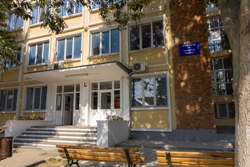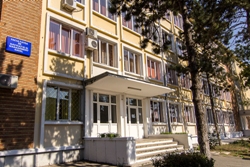The Department provides specialized training in the areas of naval electrical and electronics for the following specializations: electro mechanics, naval electro mechanics, navigation and logging port - full time, part time and graduate courses required for the master. It is also managing the electro-mechanics specialty. The curricula contain many important subjects that represent the base study within the department.
Subjects taught within the Department:
- Introduction to electro-technics
- Introduction to naval electrical engineering
- Engineering materials
- Electromagnetic field theory
- Electrical measurements and transducers
- Electrical and electronic measurements
- Electrical drives and machines
- Naval automation
- Electrical onboard equipment
- Electrical circuits theory
- Electronic Devices and Circuits
- Introduction to hydro-location and radiolocation
- Hydro-location and radiolocationsystems
- Electro-magneticcompatibility
- Electronics
- Analogue electronics
- Digital electronics
- Static converters
- Electromagnetic converters
- Microwave equipment
- Systemswith microprocessors
- Microcontrollers andprogrammable automation
- Interface transducers and data acquisition
- Electrical equipment
- Radiolocation equipment
- Naval communication systems
- Automated systems theory
- GMDSS naval communication
- Quality and reliability
Scientific workshops
Applications of mathematics, physics and computer science in electrical engineering
Coordinating teachers:
- Senior Lecturer Vasiliu Paul, PhD
- Senior Lecturer Pazara Tiberiu, PhD
- Assistant Lecturer Olteanu Anda, PhD
English for marine engineering and intermar
Coordinating teacher:
- Associate Professor Balagiu Alina, PhD
Used of power electricity
Coordinating teachers:
- Associate Professor Eng Deliu Florentiu, PhD
- Professor Eng Samoilescu Gheorghe, PhD
- Professor Eng Dobref Vasile, PhD
Renewable energy
Coordinating teachers:
- Associate Professor Eng Deliu Florentiu, PhD
- Senior Lecturer Eng. Ciocioi Iancu, PhD
- Senior Lecturer Eng. Pana Leon, PhD
- Assistant Lecturer Eng. Dragomir Eduard, PhD
Laboratories
- Interdisciplinary Laboratory of electrical engineering, electronics and automation that is used for laboratory work for electrical engineering, electronics, automation and physics. It has four instruction places for students; each place comprises: PC, workstation, standard type plate for controllers and processing, students’ kit, acquisition plate and soft (lab view, multi-simulator, students’ driver kit).
- Electrical equipment Laboratory for navigation and naval communications that is designated for training students working with navigation and communications equipment placed on the bridge. It has: navigation radar track X JRC JMA 5310-6; G.P.S. - Compass JRC JLR-10T; Echo sounder JRC JPE-582; Ais McMurdo M2; E.C.S. - Electronic Chart System SIMRAD CS66-8CH; Loch Doppler - JRC JLN-205; Meteorologic alfacsimile - JRC JAX-9A MPX31151; GMDSS Sailer Console GMDSS A3 250W TX/Sat-C; Inmarsat mini C-GMDSS; NERA F77System; Novtex Receiver NCR-333, NAV-7; Radiotelephone VHF.DSC.
- Introduction to electro-technics Laboratory that is designated for practical works in order to understand the main laws governing the electromagnetic phenomena and work with the electric circuits.
- Electrical measurements Laboratory that is designatedto visualize the main apparatus and methods of measurementused for electrical circuits and wires.
- Electronic devices and circuits Laboratory gives the students the opportunity of practical training in order to work in the future with the main electronic devices and circuits used on a ship.
- Navigation radars Laboratory is designated for theoretical training in using the navigation radar, developing and mastering working with the radar, radar image interpretation, making avoidance manoeuvers and communicating within the crew on the navigation bridge. It contains two anti-collision Selesmar radars that are also used for military purposes.
- Maritime communication Laboratory that contains an instructor place, four operator places, two GMDSS consoles, INMARSAT Aequipment, INMARSAT B equipment, INMARSAT C equipment, HF transceiver. It can simulate all maritime communication channels: COSPAR-SARSAT, SART, NAVTEX, INMARSAT systems.
- Hydro-location Laboratory that offers the students practical training working with hydro-location and underwater communication equipment. It contains: hydro-location station and underwater communication station.
- Electricmachines Laboratory is designated for getting used toand train on electric transformers and AC and DC electric machines.
- Special electric machines Laboratory is designated to get used to electric motors, rotating transformers and step by step motors used onboard.
- Onboard electrical installations Laboratory is designated to get used to electrical installations onboard different ships: demagnetization installation, AC and DC rudder drive installations and fire alarm installations.
|






